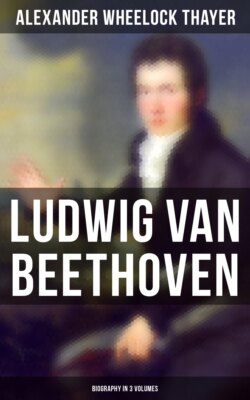Читать книгу Ludwig van Beethoven (Biography in 3 Volumes) - Alexander Wheelock Thayer - Страница 32
На сайте Литреса книга снята с продажи.
Chapter XV
ОглавлениеTable of Contents
General Bernadotte—His Connection with the “Heroic” Symphony—Rival Pianists—J. Wölffl—Dragonetti and Cramer—Compositions of the Years 1798 and 1799.
Early in the year 1798, a political event occurred which demands notice here from its connection with one of Beethoven’s noblest and most original works—the “Sinfonia Eroica.” The singular tissue of error which, owing to carelessness in observing dates, has been woven in relation to its origin may be best destroyed by a simple statement of fact.
The extraordinary demands made by the French Directory upon the Austrian government as preliminary to the renewal of diplomatic intercourse, after the peace of Campo Formio—such as a national palace and French theatre for the minister and the right of jurisdiction over all Frenchmen in the Austrian dominions—all of which were rejected by the Imperial government, had aroused to a high pitch the public curiosity both as to the man who might be selected for the appointment and as to the course he might adopt. This curiosity was by no means diminished by the intelligence that the new minister was Jean Baptiste Bernadotte, the young general who had borne so important a part in the recent invasion of Istria. He arrived in Vienna on February 5th, 1798. The state of the Empress’s health, who was delivered of the Archduchess Maria Clementine on the 1st of March, delayed the private audience of Bernadotte for the presentation of his credentials to the Emperor until the second of that month, and his public audience until the 8th of April. During the festivities of the court, which then took place, Bernadotte was always present, and a reporter of that day says both the Emperor and Empress held more conversation with him than with any other of the “cercle.” This familiar intercourse, however, came speedily to an end; for on the 13th Bernadotte had the rashness to display the hated tricolor from his balcony and to threaten to defend it by force. A riot occurred, and it was thought that in the extreme excitement of popular feeling nothing but the strong detachments of cavalry and infantry detailed for his protection saved his life—saved it to ascend the throne of Sweden on the twentieth anniversary of his arrival in Vienna!
Since etiquette allowed a foreign minister neither to make nor receive visits in his public capacity until after his formal reception at court, the General, during the two months of his stay, except the last five days, “lived very quietly.” Those who saw him praised him as “well behaved, sedate and modest.” In his train was Rudolph Kreutzer, the great violinist.
Bernadotte and the Heroic Symphony
Bernadotte had now just entered his 34th year; Kreutzer was in his 32nd; both of them, therefore, in age, as in tastes and acquirements, fitted to appreciate the splendor of Beethoven’s genius and to enjoy his society. Moreover, as the Ambassador was the son of a provincial advocate, there was no difference of rank by birth, which could prevent them from meeting upon equal terms. Under such circumstances, and remembering that just at that epoch the young General Bonaparte was the topic of universal wonder and admiration, one is fully prepared for the statement of Schindler upon the origin of the “Heroic” Symphony:
The first idea for the symphony is said to have gone out from General Bernadotte, then French Ambassador in Vienna, who esteemed Beethoven very highly. This I heard from several of Beethoven’s friends. I was also told so by Count Moritz Lichnowsky (brother of Prince Lichnowsky), who was often in the society of Bernadotte with Beethoven. …
Again in 1823:
Beethoven had a lively recollection that Bernadotte had really first inspired him with the idea of the “Eroica” Symphony.
This is from Schindler’s work in its first form. His unfortunate propensity sometimes to accept the illusions of his fancy for matters of fact is exhibited in the corresponding passage in his third edition:
In Bernadotte’s salon, which was open to notabilities of all ranks of life, Beethoven also appeared. He had already made it known that he was a great admirer of the First Consul of the Republic. From the General emanated the suggestion that Beethoven celebrate the greatest hero of his age in a musical composition. It was not long (!) before the thought had become a deed. (Vol. I, page 101.)
In proceeding with the history of the Symphony, Schindler extracts largely from Beethoven’s own copy of Schleiermacher’s translation of Plato. That the idea of Bonaparte as First Consul may have influenced the form and matter of the Symphony, when he came to the labor of its composition, and that Beethoven may have based for himself a sort of system of political ethics upon Schleiermacher’s Plato—all this is very possible; but Bernadotte was far away from Vienna before the consular form of government was adopted at Paris, and the “Sinfonia Eroica” had been publicly performed at Vienna before the Plato came from the Berlin press!
It is certainly to be regretted that so much fine writing by Schindler and his copyists on this point should be exploded by a date—like a ship by a single shell; but how could anyone believe that the much-employed Beethoven, at the age of 27, he who had refused two years before, even despite Wegeler’s urging, to listen to a single private lecture on Kant, had become in so short a time a Platonic philosopher?
Let us return to a field where Beethoven was even now more at home than he ever became in Plato’s political philosophy. Salieri had again engaged him for the “Widows and Orphans” concerts of April 1st and 2nd at which Haydn’s “Seven Last Words” was sung and Beethoven’s Pianoforte Quintet played. Kaiser Franz and the imperial family were present.
